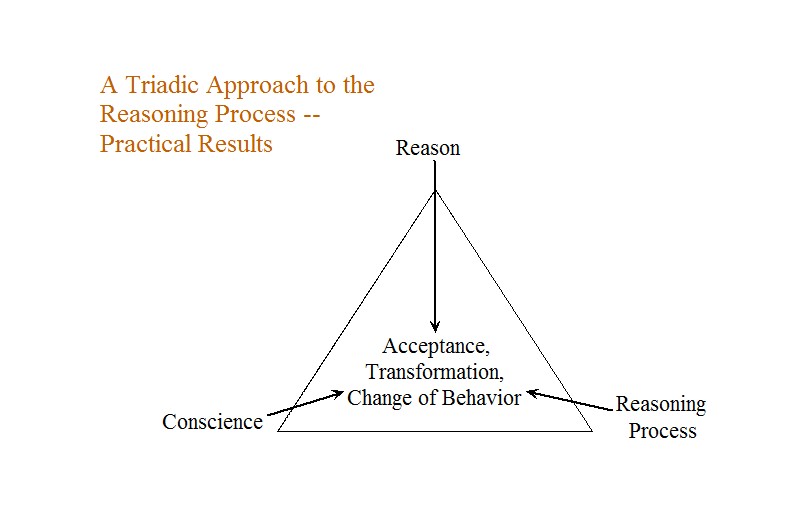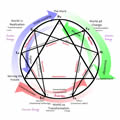Reason, Reasoning and Conscience
2015-01-29
For nearly a month now we have been struggling to understand the reasoning process. In the last few days it has become more obvious that the process of reasoning can be understood as one leg of a larger triad. This larger triad includes the faculty of conscience, which we might call the ability to directly perceive right action. It also includes Reason, which we might call our understanding of the world. To the extent that we accept each of these inputs and allow them to merge, a real transformation can take place with a subsequent change in our behaviors and manifestations, as shown in the diagram below.

As with most diagrams this overly simplifies the situation. In practice we often refuse to listen to conscience, we typically use a biased and amateurish reasoning process, and our reason is founded on a flawed cosmology. On top of that, our resistance to change means that we often reject these inputs, even if (and especially if) they are objective in nature.
- John Hutcherson's blog
- Log in to post comments

Comments
interesting
yes.
as for the diagram, among other things, i am wondering....
is there a similar triad that involves the body?
here, there are two intellectual elements (reason & reasoning process).
and there is one emotional element (conscience).
i can imagine a different triad that would involve reasoning (an aspect of higher intellectual center), conscience (an aspect of higher emotional center), and whatever the higher aspect of instinctive/moving center that tells us what is right would be.
which makes me wonder what that third higher un-named center or centers would be.
in other words, are there "higher instinctive/moving centers?"
(aside from "sex center")
what would we call them (for starters), how do they work, and how could they be helpful?
Terms and Concepts
There seems to be substantial (albeit not universal) agreement that the terms "Higher Emotional" and "Higher Intellectual" are in many ways unfortunate, because what they seem to be saying, that these centers are just higher versions of the bodily centers, turns out not to be a very helpful concept. Your speculation about a "Higher Moving Center" is just one example of how this can be misleading.
Your speculations also point to another conundrum, and that is the usefulness of speculation itself. Is it useful, for example, to speculate about an 8th and 9th chakra as some sources do? ...as though all of the sages and enlightened beings of the last 25,000 years had missed something that is now suddenly coming to light? Beelzebub has much to say about individuals who undertake this sort of activity. And yet it is this very activity of speculation, followed up by real research, reasoning and understanding that moves things forward. So there are no easy answers to this question. There is only the advice to be careful about the thought forms created through speculation.
i don't know, john...
I hear what you're saying with respect to HEC and HIC being different in kind from EC and IC, but it seems to me, to use just one example, that to go deeper into the body for guidance is quite a different thing from "speculating." (Perhaps there is also something to "common sense.") Among many other things, I believe it is important to distinguish between moving center and instinctive center, in this case, and I also believe that this is not uncharted territory as you imply.
Yours in polite disagreement,
Tim
Pondering your remarks...
After rereading this thread several times I'm left puzzled about how I implied that distinguishing between moving center and instinctive center is "uncharted territory". Or did I completely miss the point here? I'm also left puzzled as to exactly what you disagree with. I'm open to continuing this line of enquiry if you would find it useful.